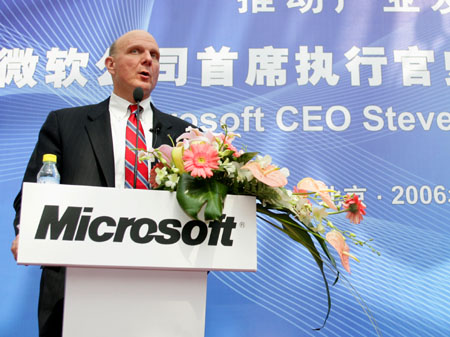|
Microsoft signs up to China again
By Liu Baijia (China Daily)
Updated: 2006-05-23 09:03
US software giant Microsoft has made another multi-million dollar commitment
to the development of the Chinese software industry as it continues to enjoy a
honeymoon period here.
Efforts will be made to help the industry grow
further and also give farmers more access to the digital world.
Steve
Ballmer, CEO of the world's biggest software firm, said yesterday in Beijing
that the firm has signed a memorandum of understanding with the Ministry of
Information Industry (MII).
In it, Microsoft promises to increase its
help to China's information industry and narrow the digital divide between
urban and rural areas.
MII and the software behemoth will also build
three centres and upgrade two existing laboratories to work with Chinese
partners on the development of new technologies and applications.

Steve Ballmer, CEO of Microsoft, the world's
biggest software firm, said yesterday in Beijing that the firm has signed
a memorandum of understanding with the Ministry of Information Industry to
increase its help to China's information industry and narrow the
digital divide between urban and rural areas.
[newsphoto] |
It will also work with MII to build
five pilot information centres for farmers to help them gain access to
agricultural and market information, as well as long-distance
learning.
Microsoft also said it would help train 1,000 instructors and
20,000 software engineers and offer online courses to another 50,000
engineers.
The software giant is expected to invest 250 million yuan
(US$31 million) in the projects.
Ballmer also said his company will
provide training and consulting for three designated Chinese firms in software
application development. It will provide university courses, curriculum
development, and other training.
These three Chinese firms are expected
to get sales of several million US dollars with Microsoft's help.
"Only
when we have the greatest partnership with Chinese companies and customers, can
we really succeed," said Ballmer.
It is the second major investment by
Microsoft in China in about one month.
On April 18, it signed a memorandum of
understanding with the National Development and Reform Commission to start their
second phase of co-operation.
In 2002, Ballmer signed an agreement with
the Chinese commission to begin co-operation. In that deal, Microsoft said it
would give contracts and investments worth US$750 million over three years to
help China nurture its information technology industry.
All this
investment and commitment has not gone unnoticed by China. President Hu Jintao
said during his recent visit to Microsoft's headquarters that Bill Gates was a
friend to China and the Chinese people.
In return for the help from the
software giant, three top Chinese computer makers Lenovo Group, Founder
Technology and Tsinghua Tongfang have promised to buy US$1.7 billion worth
of software from Microsoft.
Furthermore, the Chinese Government required
that all computers sold from this year have genuine operating systems installed,
and not pirated ones.
Considering the shipment of almost 20 million
computers last year, the market can bring enormous potential to any software
firm.
In the agreement signed last month, the software titan promised to
outsource hardware production including keyboards, mice and Xbox game consoles
to equipment manufacturers in China. The amount was supposed to be US$700
million a year with a total of US$3.5 billion over five years.
Microsoft
will also outsource some software development and testing contracts worth US$100
million to Chinese firms and train 10,000 software engineers.
Tang Min,
president of China Software and Services, which has been benefiting from
Microsoft's help, said co-operation with the US firm has greatly lifted the
smaller firm's software development capability, especially in
outsourcing.
Huang Yong, president of the Chinese research house CCID
Consulting, believed it would be good for Chinese firms to learn international
practices in software development and outsourcing.
(For more biz stories, please visit Industry Updates)
|
| |
|
| |
|
|
|
| Most Popular Stories in 48 Hours |
|
|
|
|